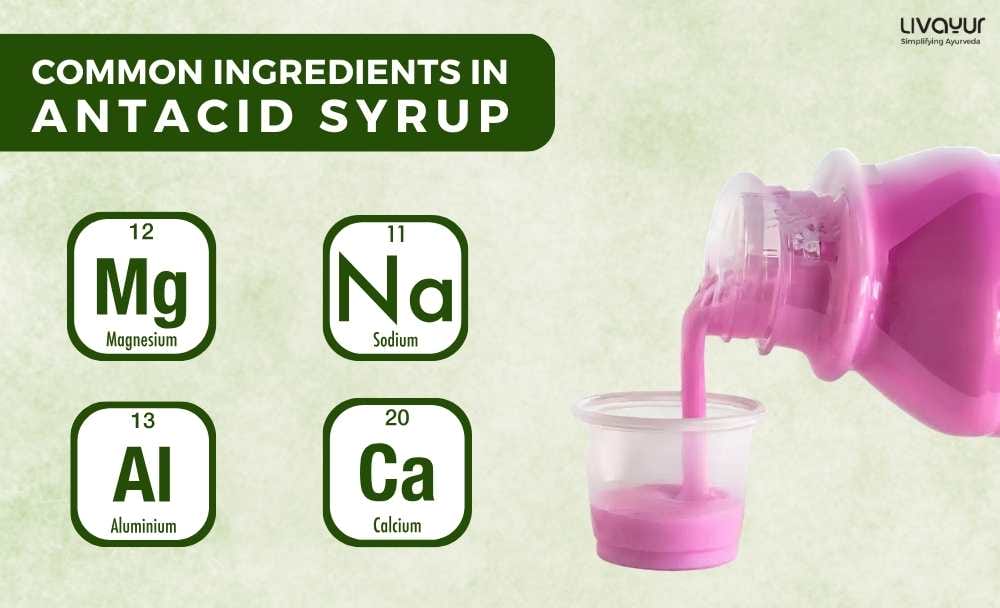
Are you tired of dealing with the discomfort of heartburn and indigestion? Looking for a convenient solution to alleviate those symptoms? Look no further than antacid syrups.
In this comprehensive article, learn everything you need to know, including antacid syrup uses, proper antacid syrup dosage, and antacid syrup side effects.
What Are Antacid Syrups?
Antacid syrups are medicine that helps relieve heartburn and indigestion.
They work by neutralizing the excess acid and inhibiting the action of the enzyme called pepsin, consequently promoting effective digestion and providing relief from heartburn.
The problem of acidity is called Amlapitta in Ayurveda. This is a Pitta-predominant disease and occurs due to the aggravation of the Amla Guna of Pitta. The main triggers for this condition are Ama and Mandagni. When the Agni or digestive fire becomes weak, it leads to the formation of Ama or toxins. This entire occurrence leads to Amlapitta. There are several natural ingredients and herbs to treat this condition effectively. [1] In an Ayurvedic antacid tonic, those acid-suppressing ingredients are widely used.
Ingredients in Antacid Syrup[4]
Antacid syrups contain a variety of active ingredients, which can vary depending on the specific type and brand. Some commonly used ingredients include:
1. Aluminium
Aluminium hydroxide is an important ingredient in the antacid class of drugs. It can bring relief by effectively managing acidic indigestion.
2. Calcium
Calcium carbonate can impact esophageal motility and can quickly neutralize oesophageal acidity.
3. Magnesium
Magnesium, another ingredient of antacid syrup, can control acid reflux by neutralizing the acid produced in your stomach. This ingredient also facilitates bowel movement in your gut.
4. Sodium Salts
This ingredient plays an important role in managing the acids in bodily fluids. It works effectively against acidic indigestion.
When it comes to Ayurvedic tonics, some of the best tonics will have the following ingredients:
- Amalaki
- Sunthi
- Shatavari
- Musta
- Lavanga
- Yashtimadhu
- Shankha bhasma
Antacid Syrup Uses
1. Treating Excessive Stomach Acid:
Alleviates symptoms caused by excessive stomach acid, including stomach upset, heartburn, and acid indigestion.
2. Symptom Relief:
Antacid syrup also include its the ability to help alleviate various symptoms including:
- Burning sensation in the chest or stomach, especially after meals or during the night.
- Presence of an acidic or sour taste in the mouth.
- A sensation of bloating, belching, discomfort/pressure in the stomach/gut, or fullness in the stomach.
- Mild chest and stomach pain.
3. Action of Simethicone:
Simethicone, an ingredient in the medication, aids in breaking up gas bubbles in the gastrointestinal tract.
4. Fast-Acting Antacids:
Aluminum and magnesium antacids in liquid form work quickly to reduce stomach acid levels. Liquid antacids generally have faster and more effective action compared to tablets or capsules.
5. Combination Therapy:
It can be used alone or alongside other medications that decrease acid production, such as H2 blockers (e.g., cimetidine/ranitidine) or proton pump inhibitors (e.g., omeprazole).
6. Addressing Acid Reflux:
Yet another of the several antacid syrup uses is that it provides relief from symptoms associated with acid reflux, medically termed GERD (gastroesophageal reflux disease). [2]
7. Treating Duodenal and Gastric Ulcers:
Aiding in the management of ulcers present in the duodenum and stomach. [2]
8. Addressing Stress Gastritis:
Providing relief from gastritis caused by stress-related factors. [2]
9. Assisting Pancreatic Insufficiency:
Supporting management by aiding in conditions related to pancreatic insufficiency. [2]
10. Managing Non-Ulcer Dyspepsia:
Offering relief for indigestion symptoms not associated with ulcers. [2]
11. Counteracting Diarrhea from Bile-Acid:
Assisting in the control of diarrhea caused by bile acid. [2]
12. Addressing Biliary Reflux:
Helping to manage symptoms related to biliary reflux. [2]
13. Alleviating Constipation:
Providing relief from constipation symptoms. [2]
1. Preventing Osteoporosis Risk:
Assisting in reducing the risk of osteoporosis, particularly from long-term use of certain antacids. [2]
2. Urinary Alkalinization:
Aiding in the process of raising urinary pH levels. [2]
3. Phosphate Binding in Chronic Renal Failure:
Assisting in binding phosphate in cases of chronic renal failure to manage phosphorus levels. [2]
Antacid Syrup Dosage
When it comes to antacid syrups, the dosage requirements may differ based on factors such as age and the purpose of usage. It is essential to note that dosing instructions can also vary between different manufacturers.
To ensure proper usage, it is advised to carefully read and follow the instructions provided on the packaging or consult a healthcare provider and follow their prescription.
Who Can Use Antacid Syrup?
Antacid syrups are generally safe for consumption by a wide range of individuals.
However, it is always recommended to consult your healthcare provider before starting any medication, including antacids. This is especially important if you are:
- following a low-sodium diet
- pregnant or planning to become pregnant
- taking other medications concurrently
- under the age of 12
Furthermore, people with heart failure, high blood pressure, liver disease, or kidney disease should also seek medical guidance before using antacid syrups.
Antacid Syrups Side Effects
While antacid syrups are generally safe, some of the ingredients in these syrups may produce certain side effects for certain individuals. Read to understand the various side effects of antacid syrups:
Different antacid brands contain three main ingredients, each with its own potential effects. Switching to another brand might help if you experience issues.
Antacid syrup side effects for specific ingredients:
- Magnesium-containing brands might lead to diarrhea.
- Brands with calcium or aluminum could cause constipation.
- Calcium-based antacids, albeit rarely, may contribute to kidney stone formation or other complications.
1. Acid Rebound Effect:
Sometimes, antacids can prompt your body to produce excess acid, thus aggravating your symptoms rather than alleviating them. [3]
2. Nervous System Impact:
Antacids might, in rare cases, affect the nervous system, leading to a condition known as neurotoxicity.
3. Impact on Iron Levels:
Antacids could contribute to lower levels of iron in your body, leading to iron deficiency.
4. Long-Term Bone Health Concerns:
Prolonged use of aluminum-containing antacids, especially in large amounts, might, over the years, contribute to weakened bones, possibly leading to osteoporosis.
5. Potential for High Blood Calcium Levels:
In rare instances, antacids might lead to hypercalcemia, an excess of calcium in the bloodstream.
6. Other side effects could include:
- Gas (flatulence)
- Nausea and vomiting
- Stomach cramps or pain in the abdomen
How To Safely Use Antacid Syrup?
- Use antacid syrup anytime you experience symptoms of heartburn or indigestion. You can also take it one hour after eating, which is generally the time most people experience heartburn. Thus, the question ‘antacid syrup when to take’ is answered for you.
- Always adhere to the instructions on the label of the specific antacid brand you are using. Dosage and frequency may vary between different brands, so it is crucial to follow the recommended guidelines.
- If you encounter symptoms during the night and decide to take an antacid before bed, refrain from consuming food simultaneously.
- Remember that antacid syrup may interact with the absorption of other medicines. Therefore, it is advised to contact your healthcare provider to see if it is right for you. To prevent interaction, it is recommended to take other medicines one hour before or at least four hours after taking an antacid syrup.
Interactions with other drugs
It is crucial to note that antacids can have adverse interactions with a broad spectrum of medications used to treat severe health conditions such as seizures, heart rhythm irregularities, Parkinson’s disease, antibiotics, and psychiatric disorders.
It is recommended to take other medicines either an hour before or four hours after using antacids to avoid potential interaction issues.
Therefore, it is essential to consult your doctor before combining antacids with any other medications.
Consultation is also recommended before regular use. Speaking with a healthcare provider or pharmacist is advisable if:
- You have kidney disease, high blood pressure, or heart disease.
- You follow a low-sodium diet.
- You are already taking calcium supplements.
- You regularly take other medications.
- You have a history of kidney stones.
FAQs
1. Can I drink alcohol while taking antacid syrup?
It is generally safe to drink alcohol while taking antacid syrup, but keep in mind that alcohol may worsen symptoms and further irritate your stomach
2. Is it safe to take antacid syrup during pregnancy?
Taking antacid syrup during pregnancy is usually safe, but it’s important to consult your healthcare provider first. Check the ingredients in the antacid and ensure you stay within the recommended daily dosage.
3. Can I take antacid syrup while breastfeeding?
Antacid syrups are safe to take while breastfeeding, as long as you don’t exceed the recommended daily dosage. Some ingredients, like calcium, can pass into breast milk, but they are generally considered safe for consumption.
4. Are antacid syrups addictive?
No, antacid syrups are not addictive. However, if you rely on them regularly to manage symptoms, it’s recommended to discuss this with your healthcare provider.
5. Which are the most effective home remedies for acidity?
Ayurveda recommends the use of natural ingredients such as herbs and simple ingredients from your kitchen to treat the problem of acidity. Here are a few effective home remedies for the problem
• Mix ghee in hot water and add some salt. Take the mixture to get relief from acidity. Butyrate acid in ghee aids digestion.
• Chewing fennel seeds after a meal gives relief from acidity.
• Spicy and oily foods may aggravate the problem of acidity or heartburn. So, consume light foods that are easy for your digestive system.
• Ayurveda considers water as an elixir and cleansing agent. Drinking plenty of water is the solution for most health issues, including acidity. Water helps in flushing out toxins from your body, and that keeps your digestive system working properly.
Conclusion
Antacid syrups are a convenient and accessible solution for people seeking relief from heartburn and indigestion. By neutralizing excess stomach acid and inhibiting enzymes involved in digestion, these syrups effectively alleviate symptoms and promote digestive comfort. In this article, we have aptly discussed the various antacid syrup uses, antacid syrup side effects, and interactions. However, it is important to follow the dosage instructions provided by the specific brand and consult a healthcare provider if needed.





















